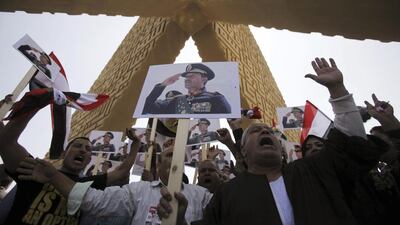CAIRO// Anti-government protesters battled security forces and civilians in Cairo on Sunday while attempting to reach Tahrir Square, where government supporters rallied to celebrate the 40th anniversary of Egypt’s 1973 war with Israel.
At least 50 people were killed and more than 240 were injured. Forty deaths were in Cairo, and six were reported south of the capital, said Khaled Al Khatib, a health ministry spokesman.
In Cairo, security forces closed several bridges leading to Tahrir Square to halt the flow of anti-government demonstrators.
Some of the fiercest clashes were in the Cairo neighbourhood of Dokki. Witnesses said they saw bodies and protesters severely injured by gunfire.
Protesters opposed to Egypt’s interim leaders – and aligned with the Muslim Brotherhood and the ousted president Mohammed Morsi – marched from five spots in the capital, calling for an end to military-backed government and vowing to reach the square that was the epicentre of Egypt’s 2011 uprising.
But Army tanks secured Tahrir Square for pro-military demonstrators waving Egyptian flags, blasting nationalist songs and praising the defence minister, Gen Abdel Fattah El Sisi, who led the removal of the highly unpopular Mr Morsi.
October 6 is the day in 1973 when Egyptian forces crossed the Suez Canal, dislodging Israeli troops from their posts in the Sinai Peninsula. Helicopters and fighter jets flew over the capital all day, to roaring cheers from the crowd.
“We are selling out of the Sisi posters,” said a Tahrir Square vendor selling portraits of the army chief and other Egyptian leaders, including the former president Gamal Abdel Nasser. “It’s like his own holiday here.”
Gen El Sisi has enjoyed a meteoric rise to power since he ousted Mr Morsi in July, following a wave of unprecedented anti-Morsi protests. Egyptians have flocked to the army as an anchor of stability after Mr Morsi’s catastrophic year in power.
Posters of Gen El Sisi in full military garb superimposed in front of the pyramids or side-by-side with lions and eagles can be seen on almost every street corner in Cairo.
In July, he called on Egyptians to take to the streets to support what he said would be the Egyptian armed forces’ fight against terrorism, a threat to the Brotherhood protesters whom had camped out in Cairo to call for Mr Morsi’s reinstatement.
In Tahrir on Sunday, pro-military demonstrators said they were there to support the general, whom many hope will become Egypt’s next president.
“Sisi is the only one who is able to run the country,” said Aya Gamel, 26, who travelled from Suez to support him. “Today, we are celebrating the 6th of October but we are also supporting Sisi.”
Among the anti-government protesters, the focus was also on the powerful general.
Demonstrators insisted they support the army, but that they want the military to leave politics.
“For 60 years, we had an army government,” said English teacher Abdullah Mohamed, 48, at an anti-government march in Cairo’s Mohandiseen district. “We like the army when it fights Israel, not when it fights its own people.” But the Brotherhood and anti-coup coalition groups have so far failed to expand support for their movement beyond their core supporters.
A campaign of violence by pro-Morsi supporters after his ouster has soured many Egyptians on returning the Islamists to politics. Gunmen now regularly attack security forces at checkpoints, and rudimentary bombs have been planted on street corners and outside government offices.
Last month, a car bomb narrowly missed the interior minister Mohamed Ibrahim’s convoy in the middle-class Cairo suburb Nasr City.
“Left, right, we will get you Ibrahim!” anti-government protesters chanted in reference to the interior ministry, who presided over a crackdown on Morsi supporters at Rabia Al Adawiyya mosque in August.
Cars honked and passersby cheered on the anti-coup demonstrators, flashing signs of solidarity with the marchers. Later, as they approached Tahrir Square, angry, anti-Brotherhood residents attacked the demonstrators alongside police. Police fired warning shots to halt potential clashes.
The interior ministry said 423 people were arrested.
As the sun set over Cairo, fighter jets traversed the skies, drawing hearts with their trails of smoke as gunfire rang out across the city.
“The day that was about Egypt fighting Israel is now about Egyptians fighting each other,” the Dubai-based commentator and Egypt watcher, Iyad El Baghdadi, said of the October 6 holiday. “What a tragedy.”
By the end of the day, in the upscale Cairo quarter Zamalek, patrons gathered at cafes to watch Egypt’s Ahly football team play Cameroon.
Across the river, celebratory fireworks blazed in Tahrir – and anti-government protesters continued to battle police just blocks from the square.
foreign.desk@thenational.ae

